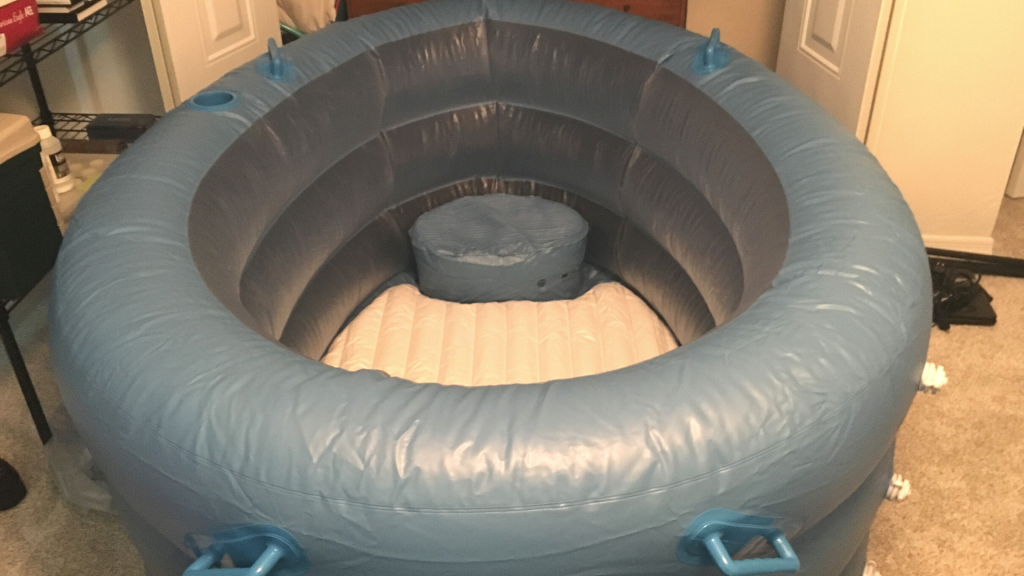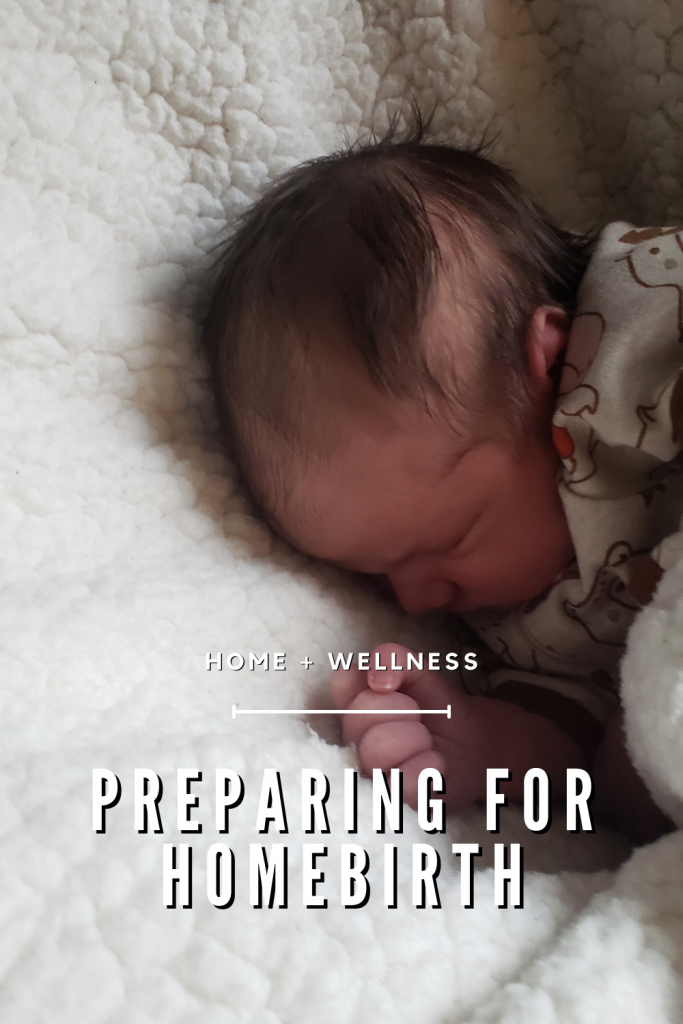There should be no mystery in planning for a homebirth, whether it’s your first or tenth. Make sure you have the information you need when preparing for homebirth, by starting here.

This post may contain affiliate links, which means we may receive a commission, at no extra cost to you, if you make a purchase through a link. Please see our full disclosure for further information.
Preparing for homebirth
There are several different categories in which a woman would want to be prepared for a successful homebirth. It is important to consider each category, but don’t let the number of considerations overwhelm you. Just keep in mind that the longer you have to prepare and the more intentional you are about preparing for birth, the less stress and difficulty you will have to juggle by the time you are ready to deliver your sweet baby.
Background and why I have something to say on this topic
(Feel free to skip this section and go right down to actual preparedness tips. But if you’d like to know why I feel confident discussing this topic, here’s why.)
First, you may wish to know why I am discussing this topic here, and how I have anything credible to share on this topic. Or you may wonder how or why we consider this an element in our self-sustainability journey. For us, these answers are simple.
I have two children and one on the way. Both of my daughters were born at home in successful and increasingly wonderful homebirths, just 16 months apart. The child we’re expecting in August of 2022 will also be born at home, if all goes well.

For me, this is a sustainability “issue” for a couple of reasons (none of which I’m prepared to argue with anyone over – these are simply my personal views and convictions).
Partially, homebirth is my first choice for delivering my kids because it helps us to maintain our debt-free lifestyle and financial independence. We do not currently carry health insurance, but even if we did, the deductible for a hospital birth in our area (and any area we’ve ever lived in) is far higher than the cost of midwife care. We are able to save for a few months and be fully paid off on our homebirth bill for each of our kids within just a couple months of delivering, or in this case, before we were half way through the pregnancy.
Another consideration for me that pushes me towards homebirth is that I do not do well under pressure. I cave easily and second guess myself even on things I have strong opinions and convictions on. For me, hospital care is a high pressure environment that I cannot relax in, so I know that going into hospital care instantly relinquishes so many of my desires for how to deliver my children. Of the many experiences I’ve had in hospitals, all were related to things going wrong and people almost dying. With that association, a hospital was not an ideal place for me to relax enough to have a good experience delivering my children.
So how do I prepare for my homebirths and what are steps you can take to have a successful experience with your homebirth? Read on!
Preparing your midwife
One of the primary ways to ensure you have a homebirth experience that is pleasant, safe, and wholesome, is to choose your midwife wisely. This may take a lot more thought for your first homebirth than for subsequent homebirths, or for a first time mama rather than a mom who has experienced birth before. But knowing what to look for in a midwife can help take the mystery out of the experience and help you to be confident that your selection process was the best it could be.
First, you need to interview your midwife to see if she is a good fit for you, and you are a good fit for her. As a first time mom choosing a homebirth, I was not immediately sure what to ask a midwife when I interviewed her to see if we were a good fit. How do you know what to ask if you have never even been pregnant before? Try these pointers.
- Ask about her background in homebirth, her education or training, if she’s had homebirths herself, etc. This gives you an idea of her “authority” and experience. Also ask how many births she’s attended, her transfer rate (when hospital care is needed after establishing midwife care, etc.), success rate, etc.
- Ask about your primary fears. What complications are possible? What constitutes “high risk”? What happens in an emergency? If you have specific medical history or family history that is a concern, bring it up even in the initial interview and this may help establish if she is confident in cases like yours and if you are confident in her ability to handle your case.
- Ask about her “style” of care. Is she very hands on? Or does she take a more mom-led approach, giving assistance and input only where needed? Many midwives will tell you they can do what you’re comfortable with, and most will be more hands on knowing it’s your first homebirth if that is what you want – just be sure to both know the midwife’s expectations as well as to let her know your expectations to see if those align.
- Ask about her assistants (if she doesn’t work alone). Get their general experience level, history, purpose, etc. Find out about which other health practitioners she works with like if she has a relationship with pediatricians, OBs, pharmacies, specific hospitals, etc. Anyone who is considered a colleague or whose services she recommends is completely fair game to ask about ahead of time.
- Ask about policies, practices, laws, restrictions, etc. She may have a file for you with printouts of all of her information regarding policies for her practice. She really should, but maybe she’ll just refer you to pages on her website. Either way, read these discerningly.
- Ask about pricing and payment plans as well as if she takes your insurance. This is important for a lot of people because many midwives are out of network or cannot bill insurance at all. Knowing what the out of pocket cost for a homebirth is (and which services this includes) is important for decision making.
- Ask any question you can think of that is important to you. In this kind of relationship, you have to fully trust the person into whose care you are choosing to put your life and your child’s life. In terms of getting to know that person professionally and being comfortable with their care, there’s basically nothing that’s off limits to ask about, and it’s often better to ask this in an initial interview than to find out later.
As a side note, some places have great homebirth laws, regulations, and practices which encourages midwives to practice in that area and also encourages them to offer competitive care. Other places it can be extremely difficult to find midwives because regulations are poor or there are many hurdles for them to be able to practice.
If you’re in an area where there are few midwives to choose from, you may have a much smaller selection, in which case the question changes from “which midwife do I like the best?” to “can I work with the one midwife who works in this region?”

Preparing your body
Once you’ve established care with a midwife, you will have someone to check on you and baby and evaluate your health and the pregnancy as a whole and give you the best advice for your individual pregnancy.
In addition to taking the advice of your homebirth midwife, here are a few things to consider in order to prepare your body for a homebirth.
Without the painkillers and medical interventions available in hospitals, like epidurals (which some midwives can still administer, but it isn’t very common) you have to prepare your body in additional ways throughout your pregnancy in order to have the most comfortable birth possible for both you and your baby.
- Chiropractic care can be very helpful during pregnancy and immediately before birth (as well as sometimes even during labor) to help you reduce pregnancy pain, discomfort, or misalignment. Webster Method chiropractors also have the benefit of knowing best practices to help prepare your body for a productive and less-painful labor, as well as ways to help position baby in utero to come out safely.
- Nutrition plays a large part in having a healthy pregnancy whether you are having a homebirth or not. But for moms trying to prepare their bodies most effectively for short productive labors or for increased stamina, there are things like Red Raspberry Leaf tea, and eating dates, and other dietary or food based methods of strengthening the uterus or softening the cervix to help labor to be as painless as possible.
- Learning good breathing exercises that you can do during labor (but which often take some amount of practice beforehand) can be hugely effective in both helping with mama’s pain management, as well as successfully moving baby’s progress along during active labor. Knowing which things can prevent progress (like lying on your sacrum, clenching your teeth, or holding your breath) can help you make the best decisions for labor positions. (Your midwife or doula can help you research, practice, and execute all of these things, so don’t be afraid to ask about them ahead of time!)
- Correct stretching, walking, posture, sleeping, etc are all things you can talk to your midwife about or research ahead of time to help you have a pain free pregnancy and a successful labor. If labor is starting and stalling then you can look into things like the Miles Circuit, or if your baby is breech (feet down, head up) then Spinning Babies or specific types of inversions can be a lifesaver and prevent you from needing interventions.
Each of these categories may make it seem like there is a lot to learn – and there is. But know that you do not need to do ALL of your research at the same time. It’s fine to look into just the things you need or are worried about, or to ask your midwife for recommendations and only learn about those particular things (as long as you trust your midwife sufficiently). This is part of why we get a 9 month gestation period to prepare ourselves for having those babies!

Preparing your mind
Mentally preparing for homebirth can look different for everyone. For some people it may be sufficient to know they’ve done their research and bought the right supplies and have a plan they’re happy with. Others need to know that their support network is available and have people they’re able to talk to and vent to leading up to delivery (or through labor). Still others will prepare for homebirth by writing birth affirmations or Bible scriptures on little cards to read through or to keep in their general birthing space for reassurance.
There are those, too, who prefer to be as “left alone” as possible during labor (or even pregnancy) and just let their natural intuition lead them through the process.
Only you can determine which things are necessary to give you peace of mind throughout your pregnancy and going into labor. And be aware that this may change between pregnancies, or even during the course of one pregnancy, and that is completely okay.
If there is something you need to keep your mind at ease during part of the process, it is good to verbalize it to those who will assist you, whether that’s your husband, your midwife, your doula, or other friends or family whose assistance or help you want.
It should simply not be overlooked that you take care to put your mind at ease as much as possible before beginning to labor, whether that’s about your homebirth itself, or other life scenarios that happen to overlap. Reducing a stress load before labor will help every labor to be better than a stressed-out labor would be.

Preparing your family (and friends!)
Preparing your spouse and other family or friends for your homebirth is going to look different for everyone depending on how comfortable they are with the idea of homebirth in the first place. If they’re on board already then preparing them is not a big deal at all. Helping to diminish their fears or anxiety on your behalf or baby’s behalf may be a challenge, however, if they’re not on board.
The best advice I have for this is to be prepared with information when you tell people about your decision, and if they’re not someone whose opinion you are concerned with, do not feel as if you have to explain yourself to them. Husbands and older children may need time to adjust to the plan, and they do have some amount of need to be brought up to speed on why you are choosing homebirth, and why they should not be alarmed or fearful.
If you do need to “talk someone into agreeing with you” about homebirth, then simply present the facts, details, and arrangements that you’re willing to share, and explain why you don’t hold the same fears. Showing how prepared you are (or are working towards being) can be all it takes to have them come around to seeing where you’re coming from.

Preparing your home
The “home” part of preparing for homebirth can be a detailed endeavor, but it can also be the easiest part of the whole affair, since there is very little nuance to it. There are specific things you’ll need for a homebirth, and things you’ll want for a homebirth, and once you have those things, your home is ready.
Your midwife will probably provide many of the things you need, but whatever she doesn’t provide she will have a list to let you know what is necessary and what you need to obtain for yourself.
Here’s a list of common things you’ll need, and after that is a list of things you may want or prefer.
- electricity/light/warmth
- clean running/drinkable water
- A clean and clear space for labor (bed, birth tub, bathtub, floor space, etc)
- Loose fitting, comfortable clothing for labor (accessible for baby to come out)
- Towels or textiles you don’t mind catching things such as blood, amniotic fluid, poop, etc.
- A peri bottle for after birth
- Pads or disposable underwear for after birth
- Warm towel/blanket/clothing/diaper for baby after birth
Those are necessities. Your midwife will tell you what else she considers necessary, but those things will sustain you and baby for a delivery if that is all you have! Some other things to consider are:
- Food for you to keep up your energy
- Electrolyte drinks in addition to water
- An exercise ball to help with positioning
- Comfy nursing clothes for after
- Perineal spray for after
- Cold packs for sitting on after
- Hot packs or a heating pad for postpartum cramps
- Any approved painkiller you’re comfortable with for cramps
- A place to rest/sleep safely with baby after
- A nursing pillow to help you begin your nursing journey
- A chuck pad to place on the bed or couch to sit on after in case of leaking blood
- Anything that makes you and your new baby more comfortable adjusting to your new role
Part of preparing your home can also mean things like deciding which room to primarily labor in, deciding if you want/need a birthing tub for a water birth (which I 10/10 recommend!), or even telling friends and family who you may wish to be present where you want them to stay for various parts of labor and delivery.
Many women will also opt to make meals ahead and freeze them to help minimize cooking after having their baby. I would consider this part of preparing your home, along with perhaps purchasing paper plates and disposable cutlery, an ample number of water bottles for during and after, and ordering or buying the things that you’ll need for the week or two immediately postpartum so you don’t have to run errands or send family out for things you’ll want to choose very specifically (like pads).

Some things we’ve used the week after delivery that I like to stock up on ahead are:
- Freezer meals
- Nursing snacks
- Electrolyte drinks like Bodyarmor
- Baby diapers and wipes (even if you plan to cloth diaper – disposables for a week or two are wonderful)
- Painkillers
- Heating pads
- Nursing pads (for leaky boobs)
- Nursing accessible clothing (if you plan to wear anything – skin to skin is optimal!)
- Burp cloths for baby
- Books, magazines, or movies to help the couch or bed recovery be less tedious
- A phone or camera for documenting that first week (it may be fuzzy to remember!)
- Again – anything that makes the adjustment painless and helps you to heal, move around only minimally, and provides you with the rest and peace of mind you need!

A prepared homebirth
These are our best tips for preparing for homebirth. Of course, the process will look different for every person and every situation, but hopefully this information takes a little bit of the confusion and mystery out of beginning the process. Anything that enables you to take control of your pregnancy, plan ahead, and remove stressful unknowns from your pregnancy and labor are ideal.
Please leave us a comment or send us an email if you have anything you would recommend adding to these tips, or if you have any questions about any of it! Wishing you the best in your pregnancy journey!

This is great! I absolutely loved my two homebirths. I appreciate the list you made of questions to ask a midwife before hiring. I have so many people ask about this, so it’s nice to see your list written down!
Thanks Marissa, and congrats on going the homebirth route! These things are definitely on my mind as we prepare for our third, so I’m glad that it isn’t just me who finds value in it. Please feel free to share this with friends or family considering homebirth but unsure where to begin! Hopefully it takes some of they mystery and intimidation out of it.
How insightful! I feel well educated and encouraged by your post, thank you!
Thank you so much Bre! It’s an important topic to me so I’m always glad when I can shed some light on it! 🙂
Great information! Thank you for sharing!
Thanks Ada! Glad to help!